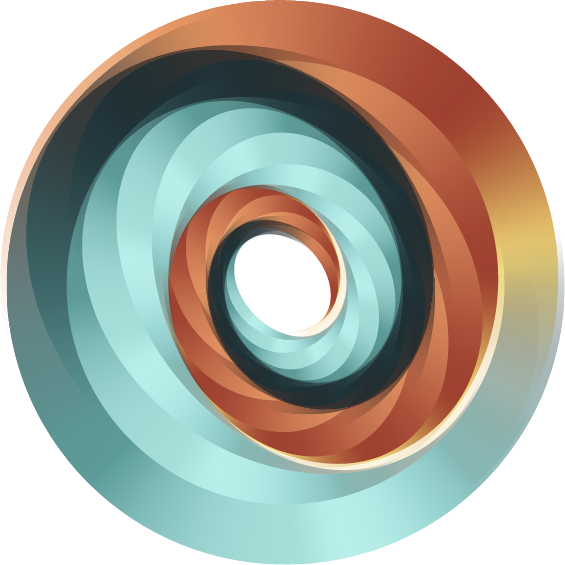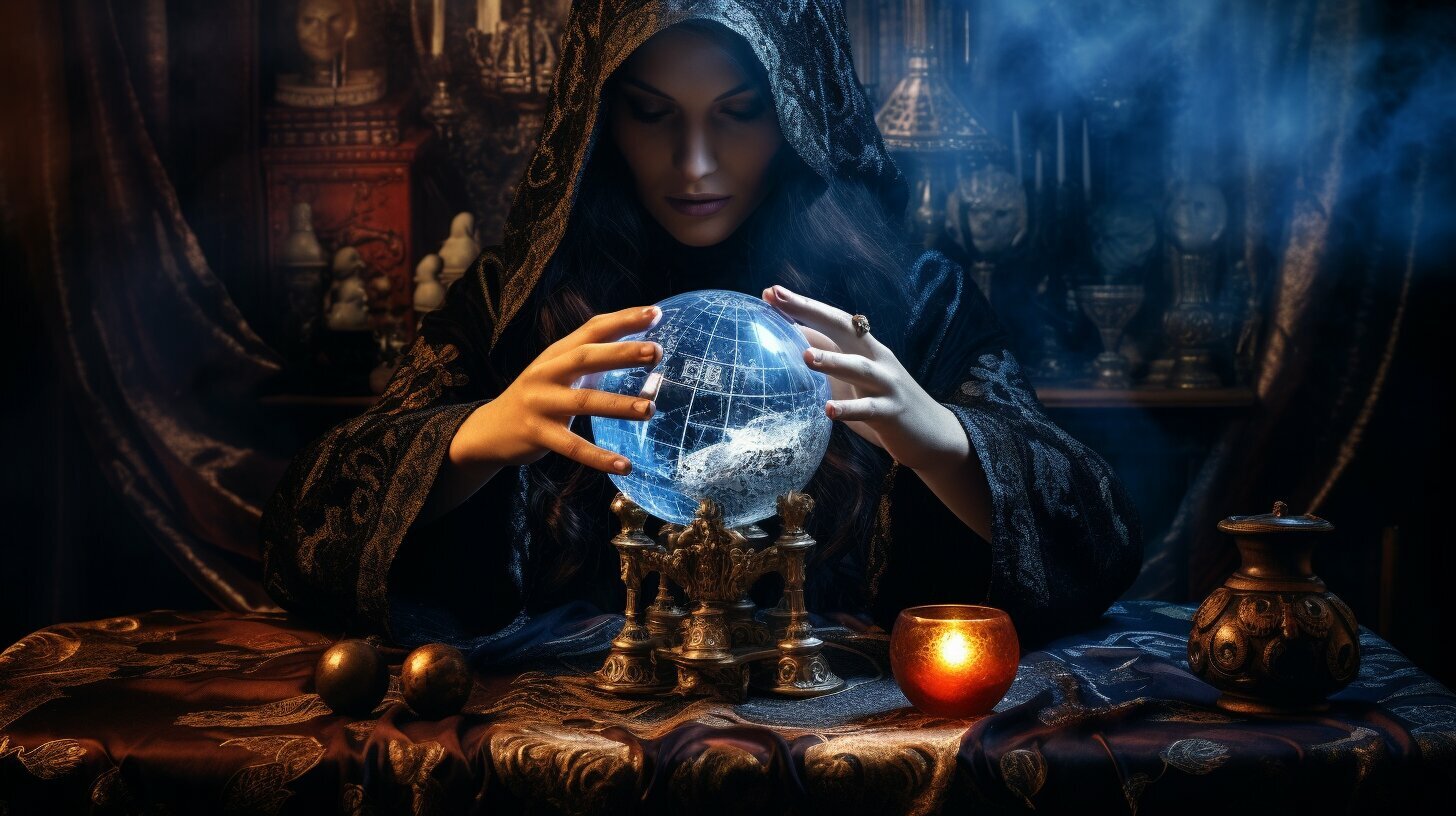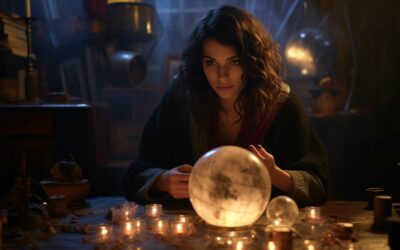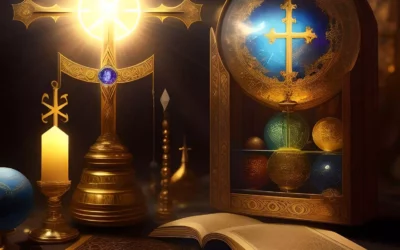Divination is a mystical practice that has been embraced by diverse cultures across the world, with numerous experts and specialists offering their unique insights and prophecies. It is a means of obtaining mystical insights, solving personal and social quandaries, and gaining guidance and clarity in decision-making.
Key Takeaways:
- Divination is a universal practice found in various cultures and societies.
- Practitioners of divination include experts, specialists, and divination professionals.
- Divination methods and techniques vary, including oracles, augury, necromancy, crystal gazing, and fortune-telling.
- Ancient divination practitioners such as Nostradamus, Gongsun Hong, Balaam, Thomas The Rhymer, and Artemidorus have made significant contributions to the field.
- Divination has evolved in contemporary society with popular practices such as horoscopes, astrology, tarot cards, and the Ouija board.
- Finding a reliable divination practitioner and understanding the services they offer is crucial in seeking mystical insights.
- Divination plays a significant role in decision-making processes and provides guidance in personal and professional contexts.
- It is deeply rooted in cultural beliefs and practices, contributing to the formation of collective identities.
- The intersection between divination and modern technology has led to the incorporation of electronic and digital advancements in divination practices.
- Divination remains relevant in an ever-evolving world, offering mystical insights and guidance to those who seek it.
The Ancient Divination Practitioners
Throughout history, divination has been practiced by notable individuals such as Nostradamus, Gongsun Hong, Balaam, Thomas The Rhymer, and Artemidorus, each renowned for their mystical insights and predictions.
Nostradamus, a French astrologer and physician who lived in the 16th century, is famous for his prophecies and predictions that have perplexed and intrigued people for centuries. His writings, known as “Les Propheties,” are filled with cryptic verses believed to foretell future events.
Gongsun Hong, an ancient Chinese philosopher and diviner, was known for his expertise in the art of divination, particularly through the use of the I Ching, or Book of Changes. He explored the correlation between patterns in nature and their symbolic meanings, offering guidance to rulers and individuals seeking insight.
Balaam, a biblical figure mentioned in the Old Testament, was a diviner and prophet who had the ability to communicate with deities and receive divine messages. His story is recounted in the Book of Numbers, where he is sought by a king to curse the Israelites but ends up blessing them instead.
Thomas The Rhymer, also known as Thomas of Erceldoune, was a Scottish poet and seer who was believed to possess the gift of prophecy. His prophecies, often delivered through poetic verse, have been attributed with foresight and accuracy regarding future events in Scottish history.
Artemidorus, a Greek author who lived during the 2nd century AD, wrote a comprehensive guide to dream interpretation called the “Oneirocritica.” His work detailed the symbolic meanings of dreams and their potential significance for individuals seeking to understand the hidden messages within their subconscious.
These ancient divination practitioners exemplify the rich history and diverse methods of obtaining mystical insights and predictions. Their contributions have shaped the field of divination and continue to captivate the imaginations of those interested in exploring the unknown.
The Ancient Divination Practitioners
| Name | Background | Notable Works |
|---|---|---|
| Nostradamus | French astrologer and physician | Les Propheties |
| Gongsun Hong | Ancient Chinese philosopher and diviner | Expertise in I Ching |
| Balaam | Biblical figure and diviner | Story in the Book of Numbers |
| Thomas The Rhymer | Scottish poet and seer | Prophecies in poetic verse |
| Artemidorus | Greek author and dream interpreter | Oneirocritica |
Divination Methods and Techniques
Divination encompasses a wide range of methods and techniques, including oracles, augury, necromancy, crystal gazing, and fortune-telling, each offering a unique approach to uncovering hidden truths and future events. These methods have been practiced by different cultures throughout history, with practitioners utilizing various tools and rituals to tap into mystical insights.
Oracles serve as intermediaries between the human and divine realms, providing guidance and answers to important questions. In ancient Greece, the Oracle of Delphi was renowned for her prophetic visions, while today, tarot cards and Ouija boards are popular tools used by diviners to communicate with spiritual entities.
Augury, on the other hand, involves interpreting natural signs and omens to gain insight into future events. This technique was commonly used in ancient Rome, where priests known as augurs would observe the flight patterns of birds or examine the behavior of animals to decipher messages from the gods.
Necromancy, a more mystical and controversial form of divination, involves communicating with the spirits of the dead. Practitioners may use mediums, seances, or spirit boards to establish contact with deceased individuals in order to seek guidance or uncover hidden knowledge.
Crystal gazing, also known as scrying, entails peering into a crystal ball or other reflective surfaces to gain visions or symbolic images. This practice relies on the belief that the crystal serves as a portal to the spiritual realm, allowing diviners to receive messages and insights.
Fortune-telling encompasses a wide range of divinatory practices aimed at predicting future events or outcomes. Some common methods include palmistry, astrology, and numerology, which analyze the lines on a person’s hands, the alignment of the stars and planets, or the significance of numbers, respectively.
| Method | Description |
|---|---|
| Oracles | Intermediaries between human and divine realms, providing guidance and answers to important questions |
| Augury | Interpreting natural signs and omens to gain insight into future events |
| Necromancy | Communicating with spirits of the dead to seek guidance or uncover hidden knowledge |
| Crystal Gazing | Peering into reflective surfaces to receive visions or symbolic images |
| Fortune-telling | Predicting future events or outcomes using various divinatory practices such as palmistry, astrology, and numerology |
Divination in Ancient Roman Culture
In ancient Roman culture, divination played a crucial role in understanding the will of the gods, with rituals and practices designed to uncover hidden significance and prophecies. The Romans believed that the gods communicated their desires and intentions through various divinatory methods, and it was the duty of skilled practitioners to interpret these messages.
One popular form of divination in ancient Rome was augury, which involved observing the flight patterns and behaviors of birds to gain insight into future events. The priestly class known as the augurs were responsible for interpreting these signs and providing guidance to political leaders and individuals seeking advice.
Another method of divination used in Roman culture was haruspicy, which involved examining the entrails of sacrificed animals, such as sheep or chickens, to discern the gods’ will. The haruspices, or diviners, would carefully analyze the organs for any abnormalities or patterns that could reveal important information.
Divination also played a significant role in important decision-making processes, such as declaring war or choosing political leaders. The Romans believed that consulting the gods through divination ensured their actions were aligned with divine favor, increasing their chances of success.
| Divination Methods | Description |
|---|---|
| Augury | Observing bird behavior and flight patterns to gain insight into future events. |
| Haruspicy | Examining animal entrails to discern the gods’ will. |
| Diviner | A skilled practitioner responsible for interpreting divine messages and providing guidance. |
The Role of Divination in Ancient Roman Culture
Divination played a crucial role in the religious and social fabric of ancient Roman culture. It provided a means for individuals and political leaders to seek guidance and make decisions that were believed to be aligned with the gods’ will. Divination practices were deeply ingrained in Roman society, and the interpretation of omens and signs by skilled practitioners was highly valued.
“The Romans believed that consulting the gods through divination ensured their actions were aligned with divine favor, increasing their chances of success.”
Divination was not only practiced by priests and religious officials but was also accessible to common people. Many households had their own family gods and household altars where individuals could perform divination rituals and seek guidance on personal matters.
While divination in ancient Roman culture was seen as a way to gain insight into future events, it also served as a means of affirming one’s connection to the divine. The rituals and practices associated with divination allowed individuals to interact with the gods and seek their favor, promoting a sense of spiritual communion.
Divination in Contemporary Society
Divination has evolved in contemporary society, with practices such as horoscopes, astrology, tarot cards, and the Ouija board providing individuals with mystical insights and guidance into their lives. These divination methods have become increasingly popular as people seek answers to their questions about love, career, and personal growth.
Horoscopes, based on the alignment of celestial bodies at the time of a person’s birth, offer personalized predictions and advice. Astrology, on the other hand, uses the positions of the stars and planets to gain insight into a person’s personality traits, relationships, and life events. Tarot cards, with their rich symbolism and archetypal imagery, are used to tap into the subconscious and provide guidance for decision-making. The Ouija board, a tool for communication with spirits, is often used to seek answers from the other side.
These divination practices have become more accessible than ever before, with online platforms offering digital horoscopes and virtual tarot card readings. Many individuals turn to these practices for guidance and inspiration in their daily lives, seeking clarity and a deeper understanding of themselves and the world around them.
| Divination Practice | Description |
|---|---|
| Horoscopes | Personalized predictions and advice based on the alignment of celestial bodies at the time of a person’s birth. |
| Astrology | Using the positions of the stars and planets to gain insight into a person’s personality, relationships, and life events. |
| Tarot Cards | Using symbolic imagery to tap into the subconscious and provide guidance for decision-making. |
| Ouija Board | A tool for communication with spirits, often used to seek answers from the other side. |
Whether seeking guidance on a specific issue or simply looking for a sense of direction, divination practices offer a way for individuals to explore their own intuition and connect with something greater than themselves. While some may view these practices as mere entertainment or superstition, for many, divination provides a source of comfort, insight, and inspiration in navigating the complexities of life.
Divination Practitioners and Experts
Divination practitioners and experts are skilled individuals who provide specialized insights and guidance through their divination services, offering individuals the opportunity to gain valuable mystical insights. These professionals have a deep understanding of various divination methods and techniques, allowing them to interpret signs, symbols, and omens to provide clarity and guidance in different aspects of life.
Whether it’s through the use of oracle cards, astrology charts, or psychic readings, divination practitioners have honed their abilities to tap into higher realms of consciousness and access information beyond the physical realm. They are trained to interpret the messages they receive and provide meaningful and relevant guidance to their clients.
Finding a reliable divination practitioner is essential for those seeking mystical insights. It is important to research and seek recommendations to ensure the practitioner’s credibility and expertise. Divination consultants and specialists often offer a range of services, including tarot readings, astrology consultations, and numerology interpretations.
Divination Services
Divination services cater to individuals seeking answers, guidance, and clarity in various areas of life, such as love, career, finances, and spirituality. Divination readers use their intuitive abilities and divination tools to connect with their clients and provide valuable insights into their current situations and future possibilities.
Divination practitioners often offer personalized and tailored readings, considering the unique circumstances and needs of each individual. They may use a combination of divination methods to provide a comprehensive and holistic understanding of the client’s situation. Through their expertise, divination professionals can help individuals make informed decisions and navigate life’s challenges with confidence.
| Divination Method | Description |
|---|---|
| Tarot Cards | Using a deck of cards with symbolic imagery, tarot readers interpret the cards to gain insights into various aspects of life. |
| Astrology | By analyzing the positions of celestial bodies at the time of a person’s birth, astrologers provide insights into personality traits, relationships, and life events. |
| Numerology | Using numbers and their symbolic meanings, numerologists interpret patterns and combinations to gain insights into a person’s life path and destiny. |
| Palmistry | Examining the lines and features of a person’s palm, palm readers offer insights into personality traits, potential strengths, and challenges. |
Divination practitioners and experts play a valuable role in helping individuals gain a deeper understanding of themselves and the world around them. Through their mystical insights, they offer guidance, clarity, and support, empowering individuals to make informed choices and navigate life’s journey with confidence.
The Role of Divination in Decision-Making
Divination plays a significant role in decision-making, offering individuals valuable insights and guidance that can contribute to making informed choices in various aspects of life. Whether it’s seeking advice on career decisions, relationship matters, or personal growth, divination provides a means of tapping into mystical insights that can help navigate the complexities of life.
One of the key benefits of divination is its ability to provide clarity and direction. By consulting divination practitioners or using divination tools such as tarot cards or astrology charts, individuals can gain a deeper understanding of their current circumstances and potential future outcomes. This knowledge can empower them to make decisions that align with their values and aspirations.
Furthermore, divination offers a unique perspective that goes beyond rational analysis. It taps into intuition and the subconscious mind, uncovering hidden elements and patterns that may not be immediately apparent. This deeper level of understanding can shed light on underlying motivations, emotions, and energies that can impact decision-making.
Divination also provides a sense of connection to something greater than oneself. It allows individuals to tap into the collective wisdom and knowledge of the universe, accessing insights that go beyond their individual experiences. This connection to a higher power or universal energy can provide comfort, reassurance, and guidance during times of uncertainty.
The Importance of Finding Reliable Divination Practitioners
When seeking divination services, it is crucial to find reliable and experienced practitioners. These professionals have honed their skills through years of practice and study, and they can provide accurate and insightful readings. It is important to do thorough research and read reviews to ensure that you are working with a reputable and trustworthy divination practitioner.
Divination practitioners offer a range of services, including tarot readings, astrology consultations, numerology readings, and more. Each practitioner may have their own expertise and approach, so it is essential to find someone who resonates with you and your specific needs. By establishing a rapport with a divination practitioner, you can develop a long-term relationship that supports your ongoing personal and spiritual growth.
Conclusion
In conclusion, divination has a significant role in decision-making. It offers valuable insights, guidance, and connection to something greater than ourselves. By tapping into the mystical insights provided by divination, individuals can make informed choices that align with their values, aspirations, and personal growth. With the guidance of reliable divination practitioners, the power of divination can be harnessed to navigate the complexities of life and make decisions with greater clarity and confidence.
The Cultural Significance of Divination
Divination holds great cultural significance, serving as a reflection of beliefs and practices within a society, shaping social dynamics, and contributing to the cultural fabric of a community. Across different cultures and time periods, divination has been a means to seek mystical insights, find guidance, and make important decisions.
Historical figures such as Nostradamus, Gongsun Hong, Balaam, Thomas The Rhymer, and Artemidorus have played significant roles in the development and practice of divination. These individuals have showcased the diverse methods and techniques used in divination, including oracles, augury, necromancy, crystal gazing, and fortune-telling.
The ancient Roman culture, for instance, heavily relied on divination to discern the will of the gods. Divination practices in ancient Rome involved rituals and beliefs centered around interpreting signs and omens to make important decisions and understand the future.
In contemporary society, divination has evolved and taken various forms. Horoscopes, astrology, tarot cards, and the Ouija board are popular divination practices that offer insights into personal and collective experiences. These practices have become deeply ingrained in popular culture and serve as avenues for self-reflection, guidance, and entertainment.
Divination practitioners and experts play a crucial role in providing divination services. These professionals offer their expertise in interpreting signs, symbols, and visions to provide valuable insights and guidance to those seeking answers and direction in their lives. Whether through personal consultations or online divination platforms, divination practitioners provide a valuable service to those in search of mystical insights.
The Role of Divination in Decision-Making
In addition to its cultural significance, divination plays a vital role in decision-making processes. By seeking guidance from divination practices, individuals and communities can gain clarity, reassurance, and confidence in making important life choices. Divination offers a unique perspective and adds an element of spirituality to decision-making, allowing individuals to tap into their intuition and connect with something greater than themselves.
The Cultural Significance of Divination
Overall, divination holds immense cultural significance and has a profound impact on the beliefs, practices, and social dynamics of a community. It provides a means for individuals to seek insight, guidance, and clarity in their lives, bridging the gap between the mundane and the mystical. Divination continues to evolve in contemporary society, adapting to new technologies and cultural contexts, while remaining a timeless practice for exploring the unknown and unlocking the mysteries of the universe.
| Key People | Divination Methods |
|---|---|
| Nostradamus | Oracle, augury, necromancy, crystal gazing, fortune-telling |
| Gongsun Hong | Oracle, augury, crystal gazing |
| Balaam | Oracle, augury |
| Thomas The Rhymer | Oracle, fortune-telling |
| Artemidorus | Oracle, dream interpretation |
Divination and Modern Technology
Divination has adapted to modern technology, with electronic advancements influencing the practice and accessibility of divination through tools and platforms that blend mysticism and digital innovation. With the rise of electronic media and the internet, divination practitioners and enthusiasts now have a wide range of options to explore and engage with mystical insights.
One example of the intersection between divination and modern technology is the use of electronic devices in paranormal investigations. Ghost or Divination Boxes, which generate white noise, have become popular tools for communicating with spirits and obtaining mystical insights. Paranormal investigators use these devices to capture Electronic Voice Phenomena (EVP), which are believed to be messages from the spirit realm.
Additionally, the internet has created new avenues for divination enthusiasts to access and engage with divination practices. Online divination platforms offer a variety of services, including horoscope readings, tarot card readings, and astrology reports. These digital platforms provide convenient access to divination practitioners and allow individuals to explore mystical insights from the comfort of their own homes.
The integration of modern technology into divination practices has made mystical insights more accessible and convenient for individuals seeking guidance and clarity. Whether through electronic devices or online platforms, divination continues to evolve and adapt to the digital age, providing a bridge between ancient mysticism and contemporary society.
| Advancements in Divination | Examples |
|---|---|
| Electronic Paranormal Investigation Tools | Ghost or Divination Boxes, EVP capture |
| Online Divination Platforms | Horoscope readings, tarot card readings, astrology reports |
Conclusion
Divination, with its rich history and diverse methods, continues to captivate individuals seeking mystical insights and unique prophecies, offering a glimpse into the hidden significances and causes of events while guiding personal and collective decision-making. The practice of divination has been present in various cultures throughout time, with ancient divination practitioners like Nostradamus, Gongsun Hong, Balaam, Thomas The Rhymer, and Artemidorus leaving their mark in the field.
There are numerous methods and techniques used in divination, ranging from oracles and augury to necromancy, crystal gazing, and fortune-telling. Ancient Roman culture embraced divination as a means to discern the will of the gods, while contemporary society has witnessed the evolution of divination through popular practices like horoscopes, astrology, tarot cards, and the Ouija board.
Today, divination practitioners and experts offer their services to those seeking guidance and insights. These professionals play a crucial role in helping individuals navigate important life choices and find clarity amidst uncertainty. Additionally, divination holds cultural significance, deeply rooted in beliefs and practices that shape social dynamics and contribute to the formation of collective identities.
Moreover, divination has adapted to modern technology, with electronic and digital advancements influencing the practice. From paranormal investigation tools to online divination platforms, technology has opened new avenues for individuals to engage with divination and explore mystical realms.
In conclusion, divination remains a powerful tool for exploring the mysteries of life and making informed decisions. Its enduring relevance in an ever-evolving world showcases its universal appeal and the timeless quest for mystical insights.
FAQ
Q: Who practices divination?
A: Divination is practiced by individuals from various cultures and backgrounds, including divination practitioners, experts, professionals, specialists, and consultants.
Q: What are the different methods and techniques used in divination?
A: Divination involves a range of methods and techniques, including oracles, augury, necromancy, crystal gazing, and fortune-telling.
Q: How was divination practiced in ancient Roman culture?
A: In ancient Roman culture, divination was used to discern the will of the gods. It involved various rituals and beliefs related to oracles and the interpretation of omens.
Q: How has divination evolved in contemporary society?
A: In contemporary society, divination has taken on various forms, such as horoscopes, astrology, tarot cards, and the Ouija board. These practices provide insights and guidance for individuals.
Q: How can I find a reliable divination practitioner?
A: To find a reliable divination practitioner, you can search for professionals who offer divination services. Look for recommendations, read reviews, and consider their expertise in the specific method or technique you are interested in.
Q: What role does divination play in decision-making?
A: Divination can provide guidance and clarity in decision-making processes. Many individuals turn to divination for insights and advice when making important life choices.
Q: What is the cultural significance of divination?
A: Divination is deeply rooted in cultural beliefs and practices. It influences social dynamics and contributes to the formation of collective identities.
Q: How does divination intersect with modern technology?
A: Divination has adapted to modern technology, with the use of electronic devices and digital platforms. Paranormal investigation tools and online divination platforms are examples of how divination has embraced modern advancements.




